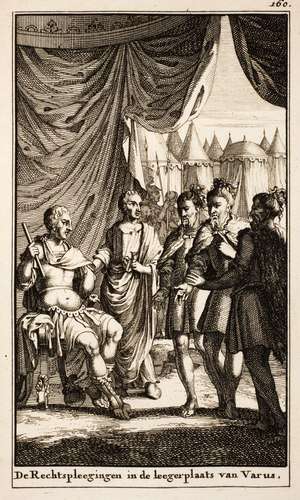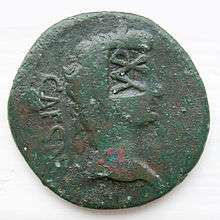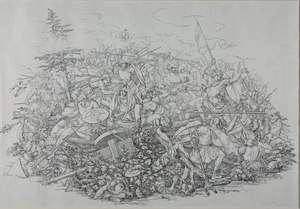Publius Quinctilius Varus
Publius Quinctilius Varus (46 BC Cremona, Roman Republic – September 15, 9 AD near Kalkriese, Germany) was a Roman general and politician under the first Roman emperor Augustus. Varus is generally remembered for having lost three Roman legions when ambushed by Germanic tribes led by Arminius in the Battle of the Teutoburg Forest, whereupon he took his own life.

Background and early career
Varus was born into the gens Quinctilia. Although he was a patrician by birth, his family, though aristocratic, had long been impoverished and was unimportant; Ronald Syme notes, "The sole and last consul of that family", Sextus Quinctilius Varus, "had been two years antecedent to the Decemvirs" (i.e. 453 BC).[1] His father, Sextus Quinctilius Varus, was a senator who had served as a quaestor in 49 BC.[1] This Sextus aligned with the Senatorial Party in the civil war against Julius Caesar.[2] Although Sextus survived the defeat, it is unknown whether he was involved in the assassination of Gaius Julius Caesar. Sextus committed suicide after the Battle of Philippi in 42 BC.[3] The mother of Varus is unknown; Syme notes that "no relatives on either side of the family can be discovered or surmised."[1]
Varus had three sisters, all named Quinctilia. They were probably all younger based on when they started having children, so it seems likely he was born at least four years before his father's suicide. The fact that they had advantageous marriages indicates someone was involved in their upbringing. One sister married Publius Cornelius Dolabella, consul of 35 BC; another married the Roman senator Sextus Appuleius, consul in 29; and the third married Lucius Nonius Asprenas, son of the consul of 36 BC.[4]
Despite Varus’ father's political allegiances, he became one of the supporters of the heir of Julius Caesar, Octavian. When Marcus Vipsanius Agrippa died in early 12 BC, Varus delivered his funeral eulogy alongside the future emperor, Tiberius.[5][6] His political career was boosted and he achieved the consulate in 13 BC, when he was elected as the colleague of Tiberius, the stepson and eventual successor of Augustus.[7]
Marriages and children
Varus married a Vipsania, a daughter of Agrippa, at an unknown date before 13 BC.[8] Varus became a personal friend to Marcus Agrippa and Tiberius. The historian Josephus says (in a section of his Antiquities whose manuscript tradition Walther John believed to be corrupt)[9] that the son of Varus, also named "Publius Quinctilius Varus", served under him during his command in Syria.[10] If true, that son would have to be a son by a prior marriage and not the son by his last wife, Claudia Pulchra.[11] It is possible that this son might have instead been an older son, Sextus Nonius Quinctilianus, whom might have ended adopted by his sisters husband after Varus and Vipsania died. That would explain why a son of Lucius Nonius Asprenas was named Quinctilianus, which implied adoption.[12]
Vipsania disappears from history. It is unknown whether she died or was divorced. Varus married again to Claudia Pulchra.[13] She was a daughter of Claudia Marcella Minor and the Roman consul of 12 BC, Marcus Valerius Messalla Appianus.[14] Her maternal grandparents were the consul Gaius Claudius Marcellus Minor and Octavia the Younger, sister of Augustus. Hence she was a grand-niece of Augustus.[15] His marriage to Pulchra shows that Varus still enjoyed political favor. Pulchra bore Varus a son, also called Publius Quinctilius Varus.[13] Through their son, they may have had further descendants.
Political career

In 8–7 BC, Varus governed the province of Africa.[16] Later he went to govern Syria from 7/6 BC until 4 BC with four legions under his command, where he was known for his harsh rule and high taxes. The Jewish historian Josephus mentions the swift action of Varus against a messianic revolt in Judaea after the death of the Roman client king, Herod the Great, in 4 BC. After occupying Jerusalem, he crucified 2000 Jewish rebels and may have thus been one of the prime objects of popular anti-Roman sentiment in Judaea (Josephus, who made every effort to reconcile the Jewish people to Roman rule, felt it necessary to point out how lenient this judicial massacre had been). Indeed, at precisely this moment the Jews, nearly en masse, began a full-scale boycott of Roman pottery (Red Slip Ware).[17] Thus, the archaeological record seems to verify mass popular protest against Rome because of Varus' cruelty.
Following the massacre in Judaea, Varus returned to Antioch.[18][19] Between 10 BC and 6 AD Tiberius, his brother Drusus, Lucius Domitius Ahenobarbus, and Germanicus conducted long campaigns in Germania, the area north of the Upper Danube and east of the Rhine, in an attempt at achieving a further major expansion of the Roman Empire together with a shortening of its frontier line. They subdued several Germanic tribes, such as the Cherusci. In 6 AD, Tiberius declared Germany pacified, and Varus was appointed to govern Germania. Tiberius, who would later rule as Emperor, left the region to suppress the Great Illyrian Revolt.
Augustus made Publius Quinctilius Varus the first "officially appointed" governor of the newly created Roman province of Germania in 7 AD.
Battle of the Teutoburg Forest and death
In September 9 AD Varus was preparing to leave his summer headquarters in Vetera (today Xanten) and march three legions – the Seventeenth, the Eighteenth and the Nineteenth – with him to Moguntiacum (modern-day Mainz), when news arrived from the Germanic prince Arminius (a Roman citizen and leader of an auxiliary cavalry unit) of a growing revolt in the Rhine area to the West. Ignoring a warning from Segestes not to trust Arminius, Varus marched his forces behind the latter's lead.

Not only was Varus' trust in Arminius a terrible misjudgement, but Varus compounded it by placing his legions in a position where their fighting strengths would be minimized and those of the Germanic tribesmen maximized – because he expected no ambush and very little trouble in intimidating the rebels. Arminius and the Cherusci tribe along with other allies, had skillfully laid an ambush, and in the Battle of the Teutoburg Forest in September at Kalkriese (East of modern Osnabrück), the Romans marched right into it.
The heavily forested, swampy terrain made the infantry manoeuvres of the legions impossible to execute and allowed the Germans to defeat the legions in detail. On the third day of fighting, the Germans overwhelmed the Romans at Kalkriese Hill, north of Osnabrück. Accounts of the defeat are scarce, due to the totality of the defeat, but Velleius Paterculus testifies that some Roman cavalrymen abandoned the infantry and fled towards the Rhine, but they were intercepted by the German tribesmen and killed.[20] Varus himself, upon seeing all hope was lost, committed suicide.[21] Arminius cut off his head and sent it to Bohemia as a present to King Marbod of the Marcomanni, the other most important Germanic leader, whom Arminius wanted to coax into an alliance, but Marbod declined the offer and sent the head on to Rome for burial.
Some captured Romans were caged and burned alive; others were enslaved or ransomed. Tacitus and Florus report that the victorious Germanic tribes tortured and sacrificed captive officers to their gods on altars that could still be seen years later.[22] The Romans did later recover the lost legions' eagles, one each in 15 AD, 16 AD and 42 AD.[23]
Aftermath
Due to the shame and the ill luck thought created by the Roman defeat, the XVII, XVIII and XIX legions never again appeared in the Roman Army's order of battle. The loss at the Teutoburg Forest was keenly felt by Augustus in his remaining years. According to the biographer Suetonius, upon hearing the news, Augustus tore his clothes, refused to cut his hair for months and, for years afterwards, was heard, upon occasion, to moan, "Quinctilius Varus, give me back my Legions!" (Quintili Vare, legiones redde!).[24] Roman historians referred to the battle as the clades Variana ("Varian disaster").[25]
Gibbon describes Augustus' reaction to the defeat as one of the few times the normally stoic ruler lost his composure. Varus' political legacy in Rome was destroyed, and the government blamed him for the defeat.[26] His son's (the younger Varus) chances for a political career were ruined. Tiberius himself fell under severe criticism for recommending Varus as the governor of Germania. Tiberius, according to Gaius Stern, was forced to sacrifice his friend and former brother-in-law to save his career.[27] Furthermore, Varus himself had been one of the figures on the Ara Pacis, but the figure is lost today.
Stern has proposed that common citizens vandalized the Ara Pacis by damaging Varus in anger over their lost loved ones, leaving the regime, which had blamed Varus, uncertain as to whether or not to fix the damage.[28] Approximately 40 years after Varus' death, a general under Claudius, Pomponius Secundus, raided Germany and by chance rescued a few POWs from Varus’ army. Claudius welcomed them home after so many years, and their sad stories aroused much pity.[29]
Cultural depictions
- I, Claudius (1934) by Robert Graves, a novelization of the reigns of the first four emperors. Varus does not actually appear in the novel, but his defeat by the Germans is an important event.
- The Iron Hand of Mars (1994) by Lindsey Davis; fourth book of the mystery series set during the reign of Vespasian, a portion of the novel occurs in the Teutoburger Wald.
- Give Me Back My Legions! (2009) by Harry Turtledove, which details the events leading up to the battle, including a great deal of background information on Varus himself.
- Undying Mercenaries (2014) by B. V. Larson, a series set in 2099, in which the main character fights with the Earth Mercenary Legion Varus. Much of the legion's culture and structure sources from Roman history and general Varus's life.
- Schlammschlacht (2015) by Heilung, track four on their first album Ofnir. The poem describes the Battle of the Teutoburg Forest from the Cherusci point of view.
References
- Syme, The Augustan Aristocracy (Oxford: Clarendon Press, 1986), p. 313
- Caesar Commentarii de Bello Civili 1.23, 2.28.1
- Velleius Paterculus, 2.71.2.
- Syme, Augustan Aristocracy, pp. 315-318
- Syme, Augustan Aristocracy, p. 146
- Murdoch, Adrian (2009). Rome's Greatest Defeat: Massacre in the Teutoburg Forest. The History Press. ISBN 0750940166.
- Alison E. Cooley, The Cambridge Manual of Latin Epigraphy (Cambridge: University Press, 2012), p. 457
- Abdale, Four days in September: The Battle of Teutoburg, p.65; Severy, Augustus and the Family at the Birth of the Roman Empire, pp. 64-5 follow Sir Ronald Syme that Varus married three times and his first wife is unknown. But there is no proof for this, it is merely Syme's opinion. Likewise, the mother of Vipsania is also uncertain. Some think her Claudia Marcella Major, e.g. Severy, Augustus and the Family at the Birth of the Roman Empire, p.p.64-5. Others think Agrippa's first wife, Caecilia Attica, Reinhold, Marcus Agrippa (1933); Gaius Stern, Women, Children, and Senators on the Ara Pacis Augustae (Berk. diss. 2006). If the former (pace Syme, Severy, Abdale), she was both daughter of Agrippa and a great-niece to Augustus. But Varus would gain nothing going from one great-niece of Augustus to another of identical social standing, if this were so (Romans do not believe the death of a wife ended the relationship between affines).
- John, Walther. "Zu den Familienhältnissen des P. Quinctilius Varus", Hermes 86.2 (1958), pp. 251–255.
- Joseph. AJ 17.288.
- See a full account of the debate in Crosby, Daniel J. (2016). "The Case for Another Son of P. Quinctilius Varus: a re-examination of the textual and scholarly traditions around Joseph. BJ 2.68 and AJ 17.288". Journal of Ancient History. 4 (1): 113–129.
- Levick, p. 36
- Tacitus, Annales 4.66.1.
- Lightman, A to Z of Ancient Greek and Roman Women, p. 205
- Abdale, Four days in September: The Battle of Teutoburg, p. 65
- Ronald Syme, The Augustan Aristocracy (1986), 320.
- 66 A.D. – The Last Revolt (DVD). History Channel.
- Josephus, Ant. 17.299
- "Varus, Quintilius". Jewish Encyclopedia. 1906. Retrieved 16 October 2019.
- Velleius Paterculus, 2.118ff
- Velleius Paterculus, 2.119.3; Florus 2.30.38; Dio 56.21
- Tacitus Annales, 1.61; Florus 2.30.37-39
- Tacitus Annales, 1.60.4, 2.25.2; Dio 60.8.7
- Suetonius, Vita Divi Augusti 23 Archived 2008-05-31 at the Wayback Machine; Dio 55.23, see also Vell. Pat. 2.117-124; Suet. Div. Aug.49; Dio 55.18-24.
- Seager, Tiberius, p.173
- Suet. Tib.18.1; see also the Vell. Pat. 2.117. Both historians preserve "the official version"
- Gaius Stern, "Varus’ Legacy After Teutoburger Wald: Roman POWs, Tiberius, and the Ara Pacis," CAMWS 2009, Minneapolis, MN.
- Gaius Stern, "Varus’ Legacy After Teutoburger Wald: Roman POWs, Tiberius, and the Ara Pacis," CAMWS 2009, Minneapolis, MN.
- Tac. Ann. 12.27.
Sources
- J. R. Abdale, Four days in September: The Battle of Teutoburg (Google eBook), Trafford Publishing, 2013
- M. Lightman & B. Lightman, A to Z of Ancient Greek and Roman Women, Infobase Publishing, 2008
- R. Seager, Tiberius (Google eBook), John Wiley & Sons, 2008
- Rome's Greatest Defeat: Massacre in the Teutoburg Forest (Hardcover) by Adrian Murdoch, Hardcover: 256 pages, Publisher: Sutton Publishing (June 14, 2006), ISBN 0-7509-4015-8, ISBN 978-0-7509-4015-3
- B. Severy, Augustus and the Family at the Birth of the Roman Empire, Routledge, 2004
- The Battle That Stopped Rome: Emperor Augustus, Arminius, and the Slaughter of the Legions in the Teutoburg Forest by Peter S. Wells, W. W. Norton & Company, October 2003, ISBN 0-393-02028-2, ISBN 978-0-393-02028-1
- A Roman Encyclopedia by Matthew Bunson, 1995 Oxford Paperback Reference
- R. Syme, The Augustan Aristocracy, Oxford University Press, 1989
- Compendium of Roman History (Res gestae divi Augusti) by Velleius Paterculus, Harvard University Press; 1924. Brief mention of the Varus Disaster by the author, who was serving as a staff officer with Tiberius in Pannonia at the time.
- The Decline and Fall of the Roman Empire by Edward Gibbon, Modern Library
- Annals by Tacitus (various editions). Summarizes reports of later Romans who found the battlefield.
- The Twelve Caesars, Suetonius, translated by Robert Graves, 1957, Penguin Books; Also available from Project Gutenberg: The Lives of the Twelve Caesars, Complete
- Levick, Barbara, Tiberius the Politician (1999)
External links
| Wikimedia Commons has media related to Varus. |
- Varusbattle in Netherland
- Livius.org: Publius Quinctilius Varus
- Discussion on the meaning of the "VAR" countermark
- Arminius / Varus. The Battle of the Teutoburg Forest – Internet-Portal "Westfälische Geschichte", LWL-Institut für westfälische Regionalgeschichte, Münster
| Political offices | ||
|---|---|---|
| Preceded by Marcus Licinius Crassus Dives, and Gnaeus Cornelius Lentulus Augur |
Consul of the Roman Empire 13 BC with Tiberius Claudius Nero |
Succeeded by Marcus Valerius Messalla Appianus, and Publius Sulpicius Quirinius |